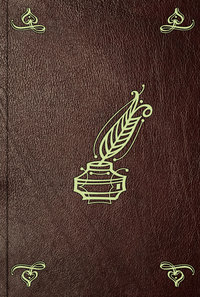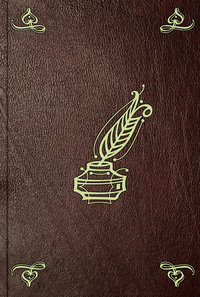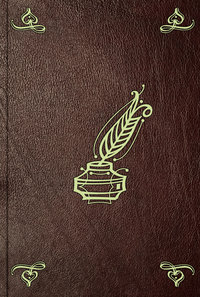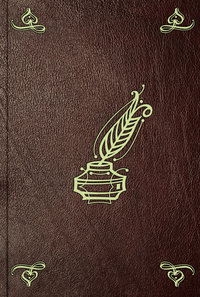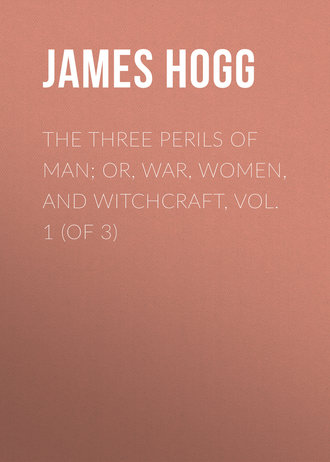 полная версия
полная версияThe Three Perils of Man; or, War, Women, and Witchcraft, Vol. 1 (of 3)
"There is my hand! Here is my sword! But the vital motion, or the light of reason, who shall ensure to me till these things are fulfilled. Nay, who shall ensure them to this wasted frame for one moment? I am not the man I have been, brother: But here I will swear to you, by all the host of heaven, to revenge your death, or die in the fulfilment of my vow. Yes, fully will I revenge it! I will waste! waste! waste! and the fire that is begun within shall be quenched, and no tongue shall utter it! Ha! ha, ha! shall it not be so, brother?"
"This is mere raving, brother; I have nothing from this."
"No, it is not; for there is a fire that you wot not of. But I will quench it, though with my own blood. Brother, there is one thing I wish to know, and for that purpose did I come hither. Do you think it behoves me to suffer you to perish in this affair?"
"That depends entirely upon your internal means of defence," answered Richard. "If there is a certainty, or even a probability, that the castle can hold until relieved by our friends, which will not likely be previous to the time you have appointed for them to attempt it; why, then, I would put no account on the life of one man. Were I in your place, I would retain my integrity in opposition to the views of Douglas; but if it is apparent to you, who know all your own resources, that the castle must yield, it is needless to throw away the life of your brother, sacrificing it to the pride of opposition for a day or a week."
Musgrave seemed to be paying no regard to this heroic and disinterested reasoning,—for he was still pacing to and fro, gnawing his lip; and if he was reasoning, or thinking at all, was following out the train of his own unstable mind.—"Because, if I were sure," said he, "that you felt that I was acting unkindly or unnaturally by you, by the Rood, I would carve the man into fragments that would oppose my submission to save my brother. I would teach them that Musgrave was not to be thwarted in his command of the castle that was taken by his own might and device, and to the government of which his sovereign appointed him. If a dog should dare to bay at me in opposition to my will, whatever it were, I would muzzle the hound, and make him repent his audacity."
"My noble brother," said Richard, "what is the meaning of this frenzy? No one is opposing your will, and I well believe no one within the castle will attempt it—"
"Because they dare not!" said he, furiously, interrupting his brother: "They dare not, I tell you! But if they durst, what do you think I would do? Ha, ha, ha!"
Douglas overheard all this, and judging it a fit time to interfere, immediately a knight opened the door of the apartment where the two brothers conversed, and announced the Lord Douglas. Musgrave composed himself with wonderful alacrity; and the greeting between the two great chiefs, though dignified, was courteous and apparently free of rancour or jealousy. Douglas first addressed his rival as follows:
"I crave pardon, knights, for thus interrupting you. I will again leave you to yourselves; but I judged it incumbent on me, as a warrior and a knight of honour, to come, before you settled finally on your mode of procedure, and conjure you, Lord Philip Musgrave, to save the life of your brother—"
"Certainly you will not put down my brave brother, Lord Douglas?" said Musgrave, interrupting him.
"As certainly," returned he, "as you put down my two kinsmen, Cleland and Douglas of Rowlaw, in mere spite and wanton cruelty, because they were beloved and respected by me. I am blameless, as it was yourself who began this unwarrantable system, and my word is passed. Sir Richard must die, unless the keys of the castle are delivered to me before Friday at noon. But I shall be blameless in any thing further. I conjure you to save him; and as an inducement, assure you, by the honour of knighthood, that your resistance is not only unnatural, but totally useless; for I have the means of commanding your submission when I please."
"Lord Douglas, I defy thee!" answered Musgrave. "You hold the life in your hand that I hold dearest on earth, save one. For these two would I live or die: but, since thy inveterate enmity will not be satisfied with ought short of the life of my only brother, take it; and may my curse, and the curse of heaven, be your guerdon. It shall only render the other doubly dear to me; and, for her sake, will I withstand your proud pretensions; and, as she enjoined me, hold this castle, with all its perils, till the expiry of the Christmas holidays, in spite of you. I defy your might and your ire. Let your cruel nature have its full sway. Let it be gorged with the blood of my kinsfolk; it shall only serve to make my opposition the stronger and more determined. For the sake of her whom I serve, the mistress of my heart and soul, I will hold my resolution.—Do your worst!"
"So be it!" said Douglas. "Remember that I do not, like you, fight only in the enthusiasm of love and chivalry, but for the very being of my house. I will stick at no means of retaliating the injuries you have done to me and mine, however unjustifiable these may appear to some,—no act of cruelty, to attain the prize for which I contend. Little do you know what you are doomed to suffer, and that in a short space of time. I again conjure you to save the life of your brother, by yielding up to me your ill-got right, and your conditions shall be as liberal as you can desire."
"I will yield you my estate to save my brother, but not the castle of Roxburgh. Name any other ransom but that, and I will treat with you. Ask what I can grant with honour, and command it."
"Would you give up the life of a brave only brother to gratify the vanity and whim of a romantic girl, who, if present herself, would plead for the life of Sir Richard, maugre all other considerations, else she has not the feelings of woman? What would you give, Lord Musgrave, to see that lady, and hear her sentiments on the subject."
"I would give much to see her. But, rather than see her in this place, I would give all the world and my life's blood into the bargain. But of that I need not have any fear. You have conjurors among you, it is said, and witches that can raise up the dead, but their power extends not to the living, else who of my race would have been left?"
"I have more power than you divine; and I will here give you a simple specimen of it, to convince you how vain it is to contend with me. You are waging war with your own vain imagination, and suffer all this wretchedness for a thing that has neither being nor name."
Douglas then lifted a small gilded bugle that hung always at his sword belt, the language of which was well known to all the army; and on that he gave two blasts not louder than a common whistle, when instantly the door of the apartment opened, and there entered Lady Jane Howard, leaning on her female attendant, dressed in attire of princely magnificence. "Lady Jane Howard!" exclaimed Sir Richard, starting up, and struggling with his fettered arms to embrace her. But when the vision met the eyes of Lord Musgrave, he uttered a shuddering cry of horror, and sprung with a convulsive leap back into the corner of the tent. There he stood, like the statue of distraction, with his raised hands pressed to each side of his helmet, as if he had been strenuously holding his head from splitting asunder.
"So! Friend and foe have combined against me!" cried he wildly. "Earth and hell have joined their forces in opposition to one impotent human thing! And what his crime? He presumed on no more than what he did, and could have done; but who can stand against the powers of darkness, and the unjust decrees of heaven? Yes; unjust! I say unjust! Down with all decrees to the centre! There's no truth in heaven! I weened there was, but it is as false as the rest! I say as false!—falser than both!—I'll brave all the three! Ha, ha, ha!"
Douglas had brought Lady Jane the apparel, and commanded her to dress in it; and, perceiving the stern, authoritative nature of the chief, she judged it meet to comply. At first she entered with a languid dejected look, for she had been given to understand something of the rueful nature of the meeting she was called on to attend. But when she heard the above infuriated rhapsody, and turned her eyes in terror to look on the speaker, whose voice she well knew, she uttered a scream and fainted. Douglas supported her in his arms; and Sir Richard, whose arms were in fetters, stood and wept over her. But Musgrave himself only strode to and fro over the floor of the pavilion, and uttered now and then a frantic laugh. "That is well!—That is well!" exclaimed he; "Just as it should be! I hope she will not recover. Surely she will not?" and then bending himself back, and clasping his hands together, he cried fervently: "O mother of God, take her to thyself while she is yet pure and uncontaminated, or what heart of flesh can endure the prospect? What a wreck in nature that lovely form will soon be! Oh-oh-oh!"
The lady's swoon was temporary. She soon began to revive, and cast unsettled looks around in search of the object that had so overpowered her; and, at the request of Sir Richard, who perceived his brother's intemperate mood, she was removed. She was so struck with the altered features, looks, and deportment of the knight, who in her imagination was every thing that was courteous, comely, and noble, and whom she had long considered as destined to be her own, that her heart was unable to stand the shock, and her removal from his presence was an act of humanity.
She was supported out of the tent by Douglas and her female relation; but when Musgrave saw them leading her away, he stepped rapidly in before them and interposed; and, with a twist of his body, put his hand two or three times to the place where the handle of his sword should have been. The lady lifted her eyes to him, but there was no conception in that look, and her lovely face was as pale as if the hand of death had passed over it.
Any one would have thought that such a look from the lady of his love, in such a forlorn situation, and in the hands of his mortal enemy, would have totally uprooted the last fibres of his distempered mind. But who can calculate on the medicine suited to a diseased spirit? The cures even of some bodily diseases are those that would poison a healthy frame. So did it prove in this mental one. He lifted his hand from his left side, where he had thrust it convulsively in search of his sword, and clapping it on his forehead, he seemed to resume the command of himself at once, and looked as calm and serene as in the most collected moments of his life.
When they were gone, he said to Sir Richard, in the hearing of the guards: "Brother, what is the meaning of this? What English traitor has betrayed that angelic maid into the hands of our enemy?"
"To me it is incomprehensible," said Sir Richard: "I was told of it by my keeper last night, but paid no regard to the information, judging it a piece of wanton barbarity; but now my soul shudders at the rest of the information that he added."
"What more did the dog say?" said Musgrave.
"He said he had heard that it was resolved by the Douglasses, that, if you did not yield up the fortress and citadel freely, on or before the day of the conception of the Blessed Virgin, on that day at noon the lady of your heart should be exhibited in a state not to be named on a stage erected on the top of the Bush-law, that faces the western tower, and is divided from it only by the moat; and there before your eyes, and in sight of both hosts, compelled to yield to that disgrace which barbarians only could have conceived; and then to have her nose cut off, her eyes put out, and her beauteous frame otherwise disfigured."
"He dares not for his soul's salvation do such a deed!" said Musgrave: "No; there's not a bloodhound that ever mouthed the air of his cursed country durst do a deed like that. And though every Douglas is a hound confest, where is the mongrel among them that durst but howl of such an outrage in nature? Why, the most absolute fiend would shrink from it: Hell would disown it; and do you think the earth would bear it?"
"Brother, suspend your passion, and listen to the voice of reason and of nature. Your cause is lost, but not your honour. You took, and have kept that fortress, to the astonishment of the world. But for what do you now fight? or what can your opposition avail? Let me beseech you not to throw away the lives of those you love most on earth thus wantonly, but capitulate on honourable terms, and rescue your betrothed bride and your only brother from the irritated Scots. Trust not that they will stick at any outrage to accomplish their aim. Loth would I be to know our name were dishonoured by any pusillanimity on the part of my brother; but desperate obstinacy is not bravery. I, therefore, conjure you to save me, and her in whom all your hopes of future felicity are bound up."
Musgrave was deeply affected; and, at that instant, before he had time to reply, Douglas re-entered.
"Scots lord, you have overcome me," said he, with a pathos that could not be exceeded: "Yes you have conquered, but not with your sword. Not on the field, nor on the wall, have ye turned the glaive of Musgrave; but either by some infernal power, or else by chicanery and guile, the everlasting resources of your cursed nation. It boots not me to know how you came possessed of this last and only remaining pledge of my submission. It is sufficient you have it. I yield myself your prisoner; let me live or die with those two already in your power."
"No, knight, that must not be," replied Douglas. "You are here on safe conduct and protection; my honour is pledged, and must not be forfeited. You shall return in safety to your kinsmen and soldiers, and act by their counsel. It is not prisoners I want, but the castle of Roxburgh, which is the right of my sovereign and my nation,—clandestinely taken, and wrongously held by you. I am neither cruel nor severe beyond the small range that points to that attainment; but that fortress I will have,—else wo be to you, and all who advise withholding it, as well as all their connexions to whom the power of Scotland can extend. If the castle is not delivered up before Friday at noon, your brother shall suffer,—that you already know. But at the same hour on the day of the Conception, if it is still madly and wantonly detained, there shall be such a scene transacted before your eyes as shall blur the annals of the Border for ever."
"If you allude to any injury intended to the lady who is your prisoner," said Musgrave, "the cruellest fiend in hell could not have the heart to hurt such angelic purity and loveliness; and it would degrade the honour of knighthood for ever to suffer it. Cruel as you are, you dare not injure a hair of her head."
"Talk not of cruelty in me," said Douglas: "If the knight who is her lover will not save her, how should I? You have it in your power, and certainly it is you that behove to do it; even granting that the stakes for which we fought were equal, the task of redemption and the blame would rest solely with you. And how wide is the difference between the prizes for which we contend? I for my love, my honour, and the very existence of my house and name; and you for you know not what,—the miserable pride of opposition. Take your measures, my lord. I will not be mocked."
Douglas left the apartment. Musgrave also arose and embraced his brother, and, as he parted from him, he spoke these ominous words: "Farewell, my dear Richard. May the angels that watch over honour be your guardians in the hour of trial. You know not what I have to endure from tormentors without and within. But hence we meet not again in this state of existence. The ties of love must be broken, and the bands of brotherly love burst asunder,—nevertheless I will save you—A long farewell my brother."
Musgrave was then conducted back to the draw-bridge, between two long files of soldiers as before, while all the musicians that belonged either to the army or the city were ranked up in a line behind them, on the top of the great precipice that over-hangs the Teviot, playing, on all manner of instruments, "Turn the Blue Bonnets wha can, wha can," with such a tremendous din that one would have thought every stone in the walls of Roxburgh was singing out the bravado.
CHAPTER VIII
Qnhat weywerde elfin thynge is thaten boie,That hyngethe still upon myne gaire, as doethMy synne of harte? And quhome rychte loth; I lofeWith not les hauckerynge. His locent eyne,And his tungis maiter comethe on myne senseLyke a remembourance; or lyke ane dreimeThat had delytis in it. Quhen I wolde say"Begone;" lo then my tung mistakethe quyte,Or fanceyinge not the terme, it sayethe "Come hidder,Come hidder, crabbed boie, unto myne syde."Old Play.That evening, after the departure of the noble and distressed Musgrave, Douglas was sitting all alone musing in a secret apartment of the pavilion, when he heard a gentle tap at the door. "Who's there?" inquired he surlily: "It is I, my lor'," said a petulant treble voice without. "Aha! my excellent nondescript little fellow, Colin Roy, is it you? Why, you may come in." Colin entered dressed in a most elegant and whimsical livery, and, forgetting himself, made the Douglas two or three graceful courtesies instead of bows.
"Aye, hem," said he, "that's very well for the page of a princess. I suppose you have been studying the graces from your accomplished mistress? But where have you been all this while? I have felt the loss of you from my hand grievously."
"I have been waiting on my royal mistress, my lor', informing her of all that is going on at the siege, and of your good fortune in the late captures you have made, wherein she rejoices exceedingly, and wishes you all good fortune and forward success; and, in token of kind remembrance, she sends you this heart of ruby set in gold and diamonds,—a gem that befits your lordship well to wear. And many more matters she has given me in charge, my lor'."
Douglas kissed the locket, and put it in his bosom, and then uttered abundance of the extravagant bombast peculiar to that age. He called her his guardian angel, his altar of incense, and the saint of his devotion, the buckler of his arm, the sword in his hand, and the jewel of his heart. "Do you think, Colin," added he, "that ever there was a maiden born like this royal lady of my love?"
"Why, my lor', I am not much skilled in these matters, but I believe the wench, my mistress, is well enough;—that is, she is well formed. And yet she is but so so."
"How dare you, you piece of unparalleled impudence, talk of your royal mistress in that strain? Or where did you ever see a form or features so elegant, and so bewitchingly lovely?"
"Do you think so?—Well, I'm glad of it. I think she is coarse and masculine. Where did I ever see such a form, indeed! Yes I have seen a much finer limb, and an arm, and a hand too! What think you of that for a hand, my lor'?"—(and with that the urchin clapped his hand on the green table, first turning up the one side of it and then the other.)—"I say if that hand were as well kept, and that arm as well loaden with bracelets, and the fingers with diamond rings, it would be as handsome as your princess's, of which you boast so much,—aye, and handsomer too."
"You are a privileged boy, Colin, otherwise I would kick you heartily, and, moreover, cause you to be whipped by the hand of the common executioner. However, you are a confidant,—all is well from you; and, to say the truth, yours is a very handsome hand for a boy's hand,—so is your arm. But what are they to those of my lovely and royal Margaret?—mere deformity! the husk to the wheat!"
"Indeed, my lor', you have an excellent taste, and a no less gifted discernment!"
"I cannot conceive of any earthly being equalling my beauteous princess, whether in the qualifications of body or mind."
"I rejoice to hear it. How blind love is! Why, in sober reality, there is the Lady Jane Howard. Is there any comparison between the princess and that lady in beauty?"
"She is, I confess, a most exquisite creature, Colin, even though rival to my adorable lady; in justice it must be acknowledged she is almost peerless in beauty. I do not wonder at Musgrave's valour when I see the object of it. But why do you redden as with anger, boy, to hear my commendations of that hapless lady?"
"I, my lord? How should I redden with anger? On my honour, craving my Lord Douglas' pardon, I am highly pleased. I think she is much more beautiful than you have said, and that, you should have spoken of her in a more superlative degree, and confessed frankly that you would willingly exchange your betrothed lady for her. I cannot chuse but think her very beautiful; too beautiful, indeed, with her blue eyes, white teeth, and ruddy lips. I dont like such bright blue eyes. I could almost find in my heart to scratch them out, she is so like a wanton. So you don't wonder at Lord Musgrave's valour, after having seen his mistress? Well, I advise your lordship, your captainship, and your besiegership, that there are some who wonder very much at your want of valour. I tell you this in confidence. My mistress thinks you hold her charms only at a small avail, that you have not gone into that castle long ago, and turned out these Englishmen, or hung them up by the necks if they refused. Musgrave went in and took it at once, for the favour of his mistress; because, forsooth, he deemed her worthy of the honour of such a bold emprize. Why, then, do not you do the same? My mistress, to be sure, is a woman,—a very woman; but she says this, that it is superabundantly ungallant of you not to have gone in and taken possession of the castle long ago. Do you know that (poor kind creature!) she has retired to a convent, where she continues in a state of sufferance, using daily invocations at the shrines of saints for your success. And she has, moreover, made a vow not to braid her hair, nor dress herself in princely apparel until the day of your final success. Surely, my lor', you ought to take that castle, and relieve my dear mistress from this durance. I almost weep when I think of her, and must say with her that she has been shabbily used, and that she has reason to envy Lady Jane Howard even in her captivity."
"Colin, you are abundantly impertinent: but there is no stopping of your tongue once it is set a-going. As to the taking of castles, these things come not under the cognizance of boys or women. But indeed I knew not that my sovereign lady the princess had absconded from the courtly circle of her father's palace, and betaken herself to a convent on my account. Every thing that I hear of that jewel endears her to me the more."
"What? even her orders for you to go into the castle, and put out the English? I assure you, my lor', she insists upon it. Whether it is her impatience to be your bride, I know not, but she positively will not be satisfied unless you very soon go into that castle, and put the Englishmen all to the outside of it, where you are now; or hang them, and bury them out of sight before she visits the place to congratulate you."
"Boy, I have no patience with you. Cease your prating, and inform me where my beloved mistress is, that I may instantly visit her."
"No; not for the Douglas' estate, which is now in the fire, and may soon be brought to the anvil, will I inform you of that. But, my lor', you know I must execute my commission. And I tell you again, unless you take this castle very soon, you will not only lose the favour of my mistress, but you will absolutely break her heart. Nothing less will satisfy her. I told her, there was a great moat, more than a hundred feet deep, and as many wide, that surrounded the castle, and flowed up to the base of its walls; that there was a large river on each side of it, and that they were both dammed and appeared like two standing seas—but all availed nought. 'There is a moat,' said I; 'But let him go over that,' said she; 'let him swim it, or put a float on it. What is it to cross a pool a hundred feet wide? How did Lord Musgrave pass over it?' 'There are strong walls on the other side,' said I: 'But let him go over these,' said she, 'or break a hole through them and go in. Men built the walls, why may not men pull them down? How did Musgrave get over them?' 'There are armed men within,' said I: 'But they are only Englishmen,' said she; 'Let Douglas' men put their swords into them, and make them stand back. How did Musgrave get in when it was defended by gallant Scots? Douglas is either no lover, or else no warrior,' added she; 'or perhaps he is neither the one nor the other.'"


